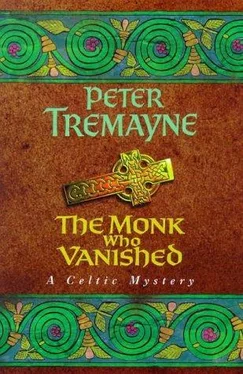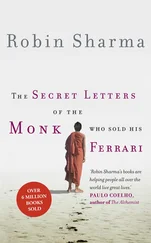Peter Tremayne - The Monk Who Vanished
Здесь есть возможность читать онлайн «Peter Tremayne - The Monk Who Vanished» весь текст электронной книги совершенно бесплатно (целиком полную версию без сокращений). В некоторых случаях можно слушать аудио, скачать через торрент в формате fb2 и присутствует краткое содержание. Жанр: Исторический детектив, на английском языке. Описание произведения, (предисловие) а так же отзывы посетителей доступны на портале библиотеки ЛибКат.
- Название:The Monk Who Vanished
- Автор:
- Жанр:
- Год:неизвестен
- ISBN:нет данных
- Рейтинг книги:3 / 5. Голосов: 1
-
Избранное:Добавить в избранное
- Отзывы:
-
Ваша оценка:
- 60
- 1
- 2
- 3
- 4
- 5
The Monk Who Vanished: краткое содержание, описание и аннотация
Предлагаем к чтению аннотацию, описание, краткое содержание или предисловие (зависит от того, что написал сам автор книги «The Monk Who Vanished»). Если вы не нашли необходимую информацию о книге — напишите в комментариях, мы постараемся отыскать её.
The Monk Who Vanished — читать онлайн бесплатно полную книгу (весь текст) целиком
Ниже представлен текст книги, разбитый по страницам. Система сохранения места последней прочитанной страницы, позволяет с удобством читать онлайн бесплатно книгу «The Monk Who Vanished», без необходимости каждый раз заново искать на чём Вы остановились. Поставьте закладку, и сможете в любой момент перейти на страницу, на которой закончили чтение.
Интервал:
Закладка:
‘I think that the truth will be found much closer to Cashel than you think,’ the Uí Fidgente lawyer replied. He suddenly leant forward across the table, thrusting his face towards her in an unblinking stare. He kept his voice in an even monotone, scarcely above a whisper. ‘I believe that your brother plots to destroy the Uí Fidgente. I believe that he means to complete the victory he gained at Cnoc Áine last yearwhen our king, Eóganián, was slain. How better to find justification to annihilate us than to claim that our Prince Donennach was involved in a plot to assassinate him out of vengeance? If he can persuade people to believe that story, then he will gain their support to destroy the Uí Fidgente. Well, I shall reveal the truth — and the truth is that it is Colgú, your brother, who is behind this plot!’
Solam sat back in defiance and folded his arms.
Fidelma was quiet for a moment or two and then she allowed a small smile to crease the corner of her mouth. She shook her head sadly.
‘You have an excellent court-room technique, Solam. Unfortunately, you would do better to keep it for the court room. But remember this, Brehons deal in facts, not in emotional outbursts.’
Solam leapt to his feet. His face was flushed. Fidelma’s assessment of his highly strung character was certainly an accurate one. Mentally she noted that his expressive irritability might be a weapon in her hands when arguing her case before the Brehons. For a moment or two, Fidelma thought that Solam’s rage was about to explode in verbal anger. Then the little dálaigh managed to control himself.
‘We shall see,’ muttered Solam angrily before he flounced from the library room. One or two of the scribes glanced up from their books, disturbed at his noisy exit.
The chief librarian rose from his seat and came over. There was a look of annoyance on his features.
‘The Uí Fidgente did not hand back his book,’ he pointed out. The book Solam was looking at was still on the table. ‘I presume that he has finished with it?’
Fidelma grimaced at the librarian. ‘I should imagine he has.’
The librarian bent to pick up the small, leather-bound volume. Fidelma suddenly stretched out a hand and stayed him.
‘One moment …’
She turned the book around so that she could read the title. It was a ‘Life of Ailbe’. She passed it back to the chief librarian thoughtfully.
Fidelma found Abbot Ségdae still with Eadulf in his private chambers. Both of them looked up with surprise as she entered the room. She came straight to the point.
‘How would Brother Bardan know that I had shown you a sketch of a crucifix found on one of the dead assassins in Cashel and that it had been identified as one of the missing Relics of Ailbe?’ she demanded without preamble.
The elderly, hawk-faced abbot blinked.
‘I did not tell him,’ he protested. ‘But it is no secret that the Relics and Brother Mochta have vanished, Fidelma.’
‘But no one would know that the crucifix had been discovered on the body of the assassin.’
The abbot spread his hands.
‘I did not think it was a matter to be made a secret among the senior religieux of this abbey. The Relics are of concern to us. After all, we are the primacy of the kingdom. This is where the Eóghanacht kings come to take their sacred oath by the ancient yew-tree. Why should this matter be a secret?’
‘I am not blaming you for anything, Ségdae,’ Fidelma assured him. ‘So, tell me, who did you mention it to?’
‘I told Brother Madagan, he being the steward of the abbey.’
‘And Brother Bardan? He was told?’
‘The abbey is a close community. New travels quickly. You cannot keep secrets from among the Brothers and Sisters of the Faith.’
Fidelma gave a mental sigh. The abbot was perfectly right in what he said.
Ségdae was clearly worried as he glanced from Fidelma to Eadulf.
‘Why do you both mention Brother Bardan?’ he asked. ‘Brother Eadulf here was also asking about him. Do you suspect him of any conduct unseemly for a member of this abbey?’
‘I have told the Father Abbot that we merely want to clarify some points of background,’ interposed Eadulf hurriedly.
‘That is so, Ségdae,’ Fidelma agreed. ‘Eadulf has doubtless asked you to use total discretion. You see, in order to get at the truth it is often necessary to ask questions about people in order to verify facts. It contains no slur on their character nor any suspicion of wrongdoing. So we would appreciate it if no mention was made of our questions to Brother Bardan.’
The abbot looked bewildered but indicated his assent. ‘I shall not speak about this to anyone.’
‘Not even to your steward, Brother Madagan,’ insisted Fidelma.
‘Not to anyone,’ emphasised the abbot. ‘I have told Eadulf here that I have every confidence in Brother Bardan. He has been with our community for over ten years, working as our apothecary and mortician.’
‘The abbot tells me he was a local man,’ Eadulf said. ‘That he was a herbalist before he went to the medical school at the monastery of Tír dhá Ghlas. He became an apothecary and mortician and then joined the community here.’
‘Had he ever been a warrior?’ asked Fidelma.
‘Never,’ replied the abbot in some surprise. ‘What gave you that idea?’
‘Just a thought. Do you know if he was a particular friend of Brother Mochta?’
‘We are all Brothers and Sisters in this community, Fidelma. Brother Bardán’s chamber was next to Brother Mochta’s. I do not doubt they would be friends. So was young Daig. Poor child. Brother Bardán had recently asked permission to take Daig into the apothecary and train him to be his assistant.’
‘So, as far as you knew, Brother Bardan was not close to the monk who vanished?’ insisted Fidelma.
Abbot Ségdae shook his head. ‘I would not know. In this community, we are all one under God.’
Fidelma nodded almost absently. ‘Very well.’ She opened the door. ‘Thank you, Ségdae.’
The abbot looked anxious. ‘Is there any news of a resolution to this mystery?’ he called fretfully.
‘I will let you know when I have some news,’ replied Fidelma tersely.
Outside, she said to Brother Eadulf: ‘Let’s go and examine Brother Mochta’s room again.’
‘Do you have an idea?’ Eadulf asked as he followed her along the corridor. She caught the expectation in his voice and had to answer him with a sardonic grunt.
‘This is one case, Eadulf, where I am totally at a loss. Whenever I think I see links, they vanish as abruptly as they come. There is nothing here but suspicion. On this evidence I would not even obtain the sympathy of the court. We now have less than a week to gather evidence.’
‘But if we cannot get evidence which points to those responsible, neither can the other side get evidence to prove their case,’ Eadulf pointed out.
‘It does not work like that,’ Fidelma told him. ‘Prince Donennach was a guest under the protection of my brother when the assassins launched their attack. My brother was responsible for the safety of his guests. He now has to demonstrate that he is not to be held responsible. Prince Donennach does not have to prove that my brother was to blame.’
‘I am not sure that I follow that.’
‘Only if my brother can show that this was a plot by the Ui Fidgente or some other faction is he absolved from his responsibility.’
‘It is a fine point,’ observed Eadulf.
‘But the fulcrum of the law nevertheless.’
‘Well, what can we hope to see in Brother Mochta’s room now? We have examined it before.’
They had reached the door of the chamber.
‘I do not know what I hope to see,’ confessed Fidelma. ‘Something. Some path out of this morass.’
Читать дальшеИнтервал:
Закладка:
Похожие книги на «The Monk Who Vanished»
Представляем Вашему вниманию похожие книги на «The Monk Who Vanished» списком для выбора. Мы отобрали схожую по названию и смыслу литературу в надежде предоставить читателям больше вариантов отыскать новые, интересные, ещё непрочитанные произведения.
Обсуждение, отзывы о книге «The Monk Who Vanished» и просто собственные мнения читателей. Оставьте ваши комментарии, напишите, что Вы думаете о произведении, его смысле или главных героях. Укажите что конкретно понравилось, а что нет, и почему Вы так считаете.












